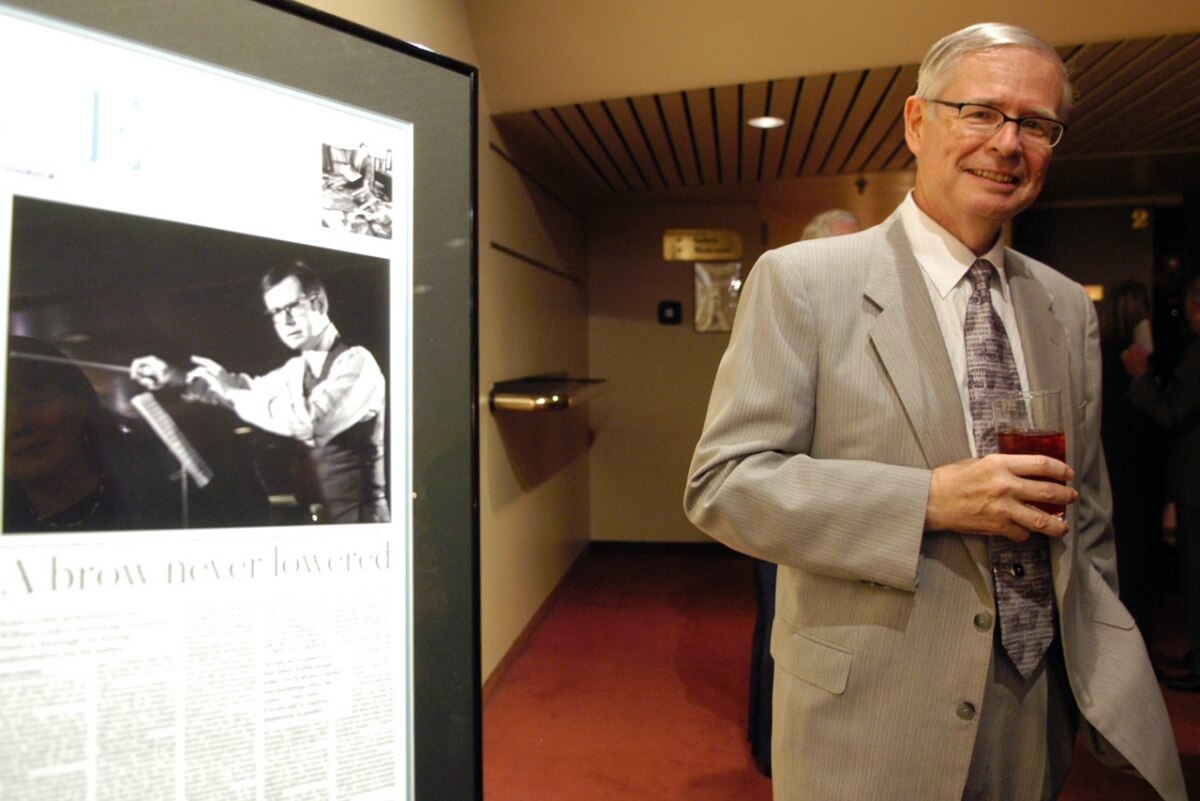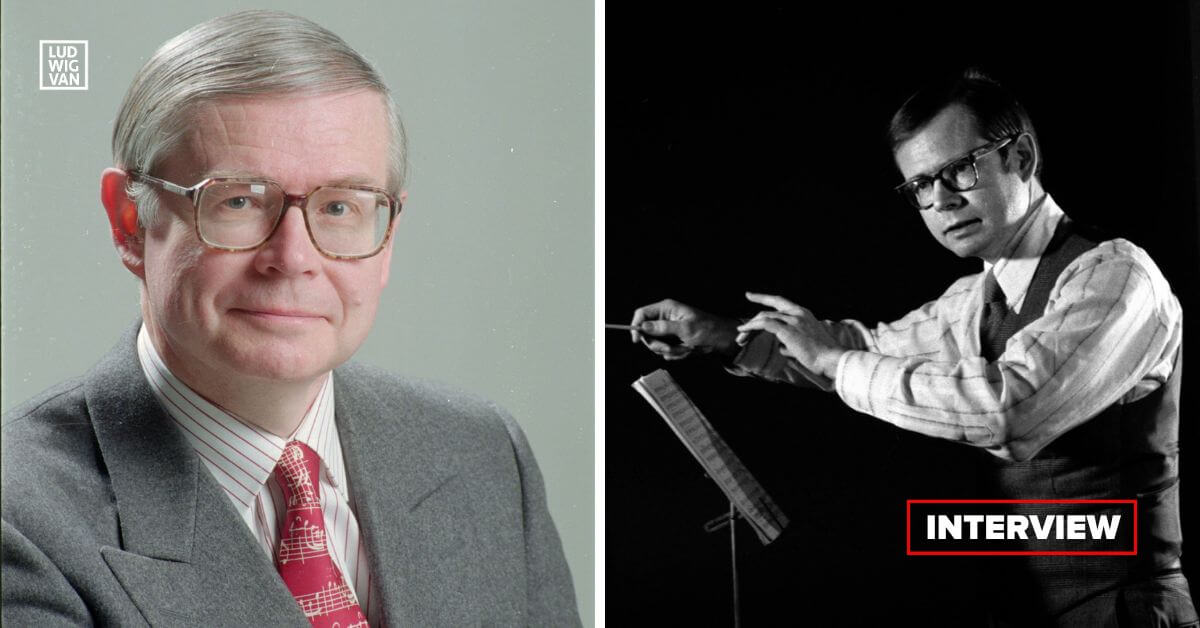The William Littler Prize for Music Criticism is open for nominations for the current year. The new award, given out each year by the Music Critics Association of North America (MCANA), recognizes excellence in writing by younger critics, specifically in the fields of concert music and opera.
The prize’s namesake is William Littler, whose career with the Toronto Star spanned nearly six decades from 1966 until 2022.
“Throughout his more than five decades with the Toronto Star, William Littler left an enduring mark on the classical music landscape. His honest and thoughtful criticism set a high standard that many critics, myself included, continue to strive for. Thanks to Bill’s support, the William Littler Prize for Music Criticism fill help foster a new generation of writers. It’s an incredible gift coming at a time with the arts journalism sector needs it most,” comments Joshua Chong, current culture reporter for the Toronto Star, in a statement.
We asked Littler about his career, and what the prize means today.
William Littler: The Interview
Littler, a native of British Columbia, began piano lessons at the age of 11, and continued his studies privately. While at UBC, under a general arts program, he studied music and criticism , and wrote his first reviews for the UBC paper Ubyssey. In 1962, he began his professional career with the Vancouver Sun. After taking a position at the Toronto Star in 1966, he became the first music critic to receive the National Newspaper Award for critical writing in 1980.
William Littler reflects on a career as a classical music critic. What does it mean, in a world where, for all intents and purposes, such a career no longer exists?
“It’s an interesting thought, that I’ve given some thought to,” he begins. “My career as a music critic in Canada is sort of unique.” His career at The Toronto Star zeroed in on classical music criticism for the final 39 years. “Which is kind of unprecedented,” he points out.
“It was traditional for serious newspapers to have a staff music critic,” he says. That he was able to write for a single publication for so long is something new writers could only dream about. “The only other paper I’d worked for is the Vancouver Sun. When I joined the Vancouver Sun, there was no pop music critic. There was a jazz critic, there was a classical music critic.”
It was an entirely different media landscape when it came to covering culture and the arts, in other words. Today, the staff critic position is gone, and anecdotally, Littler says that his American colleagues tell him there are perhaps a half dozen or so scattered at the major newspapers across the United States.
That’s why he was initially skeptical when MCANA President, and LvT freelance contributor, Arthur Kaptainis approached him with the idea of a prize for music criticism.
“Why are we funding a prize for a profession that is disappearing?” he wondered. “The profession has virtually disappeared now.”
Arthur’s reply, however, was that its demise as a profession was exactly why the practice of music criticism needed to be celebrated. Even if the idea of a career and full-time job had disappeared, the concept and practice has continued.
Littler notes some fundamental differences in how that practice continues, however. Freelancers, as he points out, don’t have the clout or the budget for travel, and often get reduced access to higher profile acts. By virtue of working for the largest newspaper in the country, he was able to convince his editors to fund his travel to other places to write, along with luxuries like help from freelance writers when he was too busy. You would fund sports reporters to travel to games, why not me? He says it’s an argument that worked back in the day.
“We were able to do a level of coverage that has disappeared now.” Reviews of not only music but other performing arts like theatre and dance are hard to come by. “I don’t think that’s going to change in the near future,” he says, citing cutbacks and diminished resources.

What’s a Music Critic?
“There’s no general rules as to how you become a critic,” William points out. He recalls answering a question on the topic from an audience member at a music festival in Parry Sound years ago. “It’s not something you intend to do – it’s kind of like shingles,” he replied. He reports that the line got a laugh from the audience.
“There are people who still want to write criticism,” he says, “but it’s not a viable career option anymore.” It’s an effort that is being upheld by freelance writers and amateurs in the true sense of the word.
The value of music reviews is often disputed. Littler relates conversations he’s had with editors who see them as a topic whose value is over very quickly. “Newspapers see little value in printing something they see as already being a kind of dead story,” he says.
He also points out that classical music was held in higher regard by previous generations, a status that secured its coverage on a preferential scale.
“I consider myself very lucky in my timing.”
What is a review, anyway? Littler remembers the words of a former editor who told him, your job is to take us to that event. It’s about recreating the experience for your readers. And, whatever that experience was, it’s not written in stone.
“It’s an opinion, not a judicial verdict.”
Littler taught as well as wrote his version of music criticism in various positions at the Royal Conservatory, University of Toronto, and other institutions. He tried to instill a kind of critical thinking process into what were more often music performance majors.
“I’m not going to try to turn you into critics, but I think it’s important to you as musicians that you think about critically about music,” he’d explain.
Those courses in music criticism, as he points out, have also disappeared.
The Prize will celebrate those who have persevered.
The William Littler Prize for Music Criticism
Here are some of the details to nominate a writer for the prize.
- Eligibility: All writers aged 40 or under on Dec. 31 of the applicable calendar year, and must be based in North America
- Three entries are permitted per person are permitted, each 2,000 words or less, and each must have been published between Jan. 1 and Dec. 31, 2023 by an established and publicly accessible website with or without a print platform.
- Littler will be on the Awards Committee who will evaluate the submissions. What are they looking for? In general, they describe a thoughtful approach, “lucid” writing style, and background preparation.
The Prize includes:
- $1,000 USD
- Republication of the winning entry (where permitted) in Classical Voice North America
- One year of membership in the Music Critics Association of North America.
No deadline is indicated, but presumably your entry will have to come in early in January 2025, with the winner announced later that year.
Find more details and the entry form [HERE].
Are you looking to promote an event? Have a news tip? Need to know the best events happening this weekend? Send us a note.
#LUDWIGVAN
Get the daily arts news straight to your inbox.

